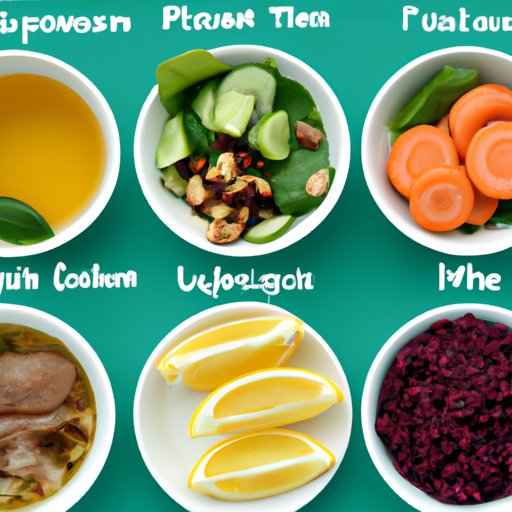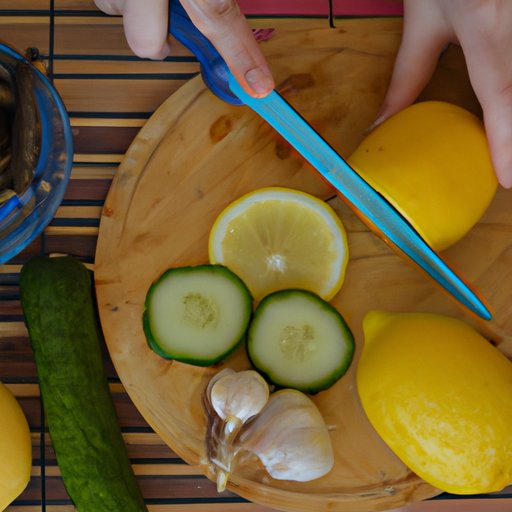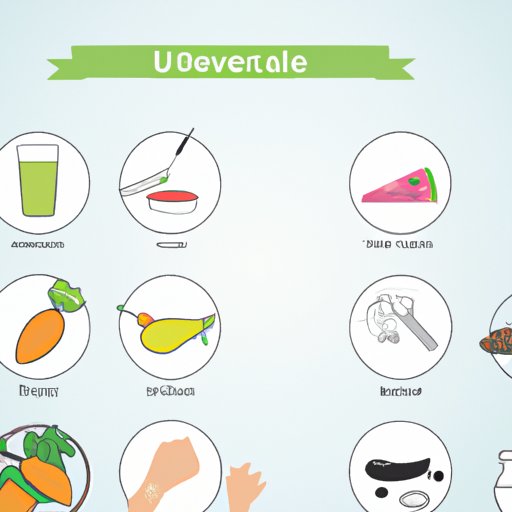Introduction
An ulcer is a sore that develops in the lining of the stomach or small intestine. It can be caused by several different factors, including stress, certain medications, and bacterial infections. Eating a balanced diet is one of the most important things you can do to manage your ulcer. In this article, we’ll explore the types of foods you should include in your diet, as well as those you should avoid.

Healthy Foods to Eat with an Ulcer
When you have an ulcer, it’s important to focus on eating a variety of nutrient-dense foods. Here are some of the best foods to include in your diet:
Fruits and Vegetables
Fruits and vegetables are packed with vitamins and minerals that can help reduce inflammation and promote healing. Aim to include a variety of colorful fruits and veggies in your diet, such as berries, apples, spinach, kale, sweet potatoes, and tomatoes. Additionally, research suggests that eating cruciferous vegetables, like broccoli, cauliflower, and Brussels sprouts, may help reduce the risk of developing ulcers.
Whole Grains
Whole grains are rich in fiber, which can help reduce inflammation and slow down digestion. Choose whole grain breads, pastas, and cereals over refined options. Oats, quinoa, and brown rice are all excellent sources of fiber.
Lean Proteins
Protein is essential for tissue repair and healing. Choose lean proteins such as chicken, turkey, fish, and legumes. These foods are also high in essential vitamins and minerals, like iron, zinc, and B vitamins.
Healthy Fats
Healthy fats, such as olive oil, avocado, nuts, and seeds, are important for optimal health. Not only do they provide essential fatty acids, but they also contain vitamin E, which has anti-inflammatory properties.

What to Avoid When You Have an Ulcer
In addition to focusing on eating healthy foods, it’s important to avoid certain foods and beverages that can worsen your symptoms. These include:
Fried Foods
Fried foods are high in fat, which can aggravate ulcers and cause abdominal pain. Avoid fried foods such as French fries, onion rings, and fried chicken.
Spicy Foods
Spicy foods can irritate the lining of the stomach and increase acid production, making your symptoms worse. Try to limit your intake of spicy foods, such as chili peppers, hot sauces, and curries.
Alcohol
Alcohol is a major trigger for ulcers. Research shows that drinking alcohol can increase the risk of ulcer formation and worsen existing ulcers. It’s best to avoid alcohol altogether if you have an ulcer.
Caffeine
Caffeinated beverages, such as coffee, tea, and energy drinks, can exacerbate ulcer symptoms. Caffeine increases stomach acid production, which can make your symptoms worse. Try to limit your caffeine intake if you have an ulcer.
The Ultimate Guide to Nutrition for People with Ulcers
In addition to knowing what to eat and what to avoid, there are some other tips to keep in mind when managing your ulcer through diet. These include:
Proper Hydration
Staying properly hydrated is essential for managing your ulcer. Water helps to flush out toxins and reduce inflammation. Aim to drink at least 8 glasses of water per day.
Eating Regularly
Skipping meals can cause your stomach to produce more acid, which can worsen your symptoms. Try to eat regular meals throughout the day, as well as healthy snacks in between meals.
Eating Slowly
Eating slowly can help minimize symptoms associated with ulcers. Slow down and chew your food thoroughly to give your stomach time to digest properly.
10 Best Foods for Ulcer Sufferers
When you have an ulcer, it’s important to focus on eating a variety of nutrient-dense foods. Here are some of the best foods to include in your diet:
Bananas
Bananas are a great source of potassium and fiber, both of which can help reduce inflammation and promote healing. They are also easy to digest and can help soothe an irritated stomach.
Oatmeal
Oatmeal is high in fiber and contains several key nutrients, including magnesium and zinc, which can help reduce inflammation. It’s also easy to digest and can help reduce symptoms associated with ulcers.
Salmon
Salmon is a great source of omega-3 fatty acids, which can help reduce inflammation. It’s also high in protein, which can help promote healing. Try to include salmon in your diet at least twice per week.
Avocado
Avocados are rich in healthy fats and fiber, both of which can help reduce inflammation. They are also high in antioxidants, which can help protect the lining of the stomach.
Apples
Apples are a great source of fiber, which can help reduce inflammation. They are also rich in antioxidants that can help protect the stomach lining from damage.
Almonds
Almonds are a good source of healthy fats, protein, and fiber. They are also high in vitamin E, which can help reduce inflammation.
Yogurt
Yogurt is probiotic-rich, meaning it contains beneficial bacteria that can help reduce inflammation and boost the immune system. Try to choose plain, unsweetened yogurt, as added sugar can worsen symptoms.
Broccoli
Broccoli is high in fiber and contains several key vitamins and minerals, including folate and vitamin C. It’s also rich in antioxidants, which can help protect the stomach lining.
Beans
Beans are a great source of fiber and plant-based protein, both of which can help reduce inflammation. They are also high in B vitamins, which can help boost your immune system.
Green Tea
Green tea is rich in antioxidants, which can help reduce inflammation and protect the stomach lining from damage. It’s also low in caffeine, making it a better choice than coffee for people with ulcers.

Simple Ways to Combat Ulcers Through Diet
In addition to eating the right foods, there are some other simple ways to manage ulcers through diet. These include:
Increase Fiber Intake
Fiber is essential for reducing inflammation and promoting healing. Aim to include plenty of fruits, vegetables, and whole grains in your diet to ensure you’re getting enough fiber.
Reduce Stress
Stress can worsen ulcer symptoms, so it’s important to find ways to manage stress. Exercise, yoga, and meditation are all great ways to reduce stress levels.
Get Enough Sleep
Getting enough sleep is essential for managing ulcers. Aim to get 7-9 hours of quality sleep each night.
Conclusion
Eating a balanced diet is one of the most important things you can do to manage your ulcer. Focus on eating a variety of nutrient-dense foods, such as fruits and vegetables, whole grains, lean proteins, and healthy fats. Avoid fried foods, spicy foods, alcohol, and caffeine, as these can worsen your symptoms. Additionally, make sure to stay hydrated, eat regular meals, and get enough sleep. By following these guidelines, you can manage your ulcer and reduce your symptoms.
(Note: Is this article not meeting your expectations? Do you have knowledge or insights to share? Unlock new opportunities and expand your reach by joining our authors team. Click Registration to join us and share your expertise with our readers.)
